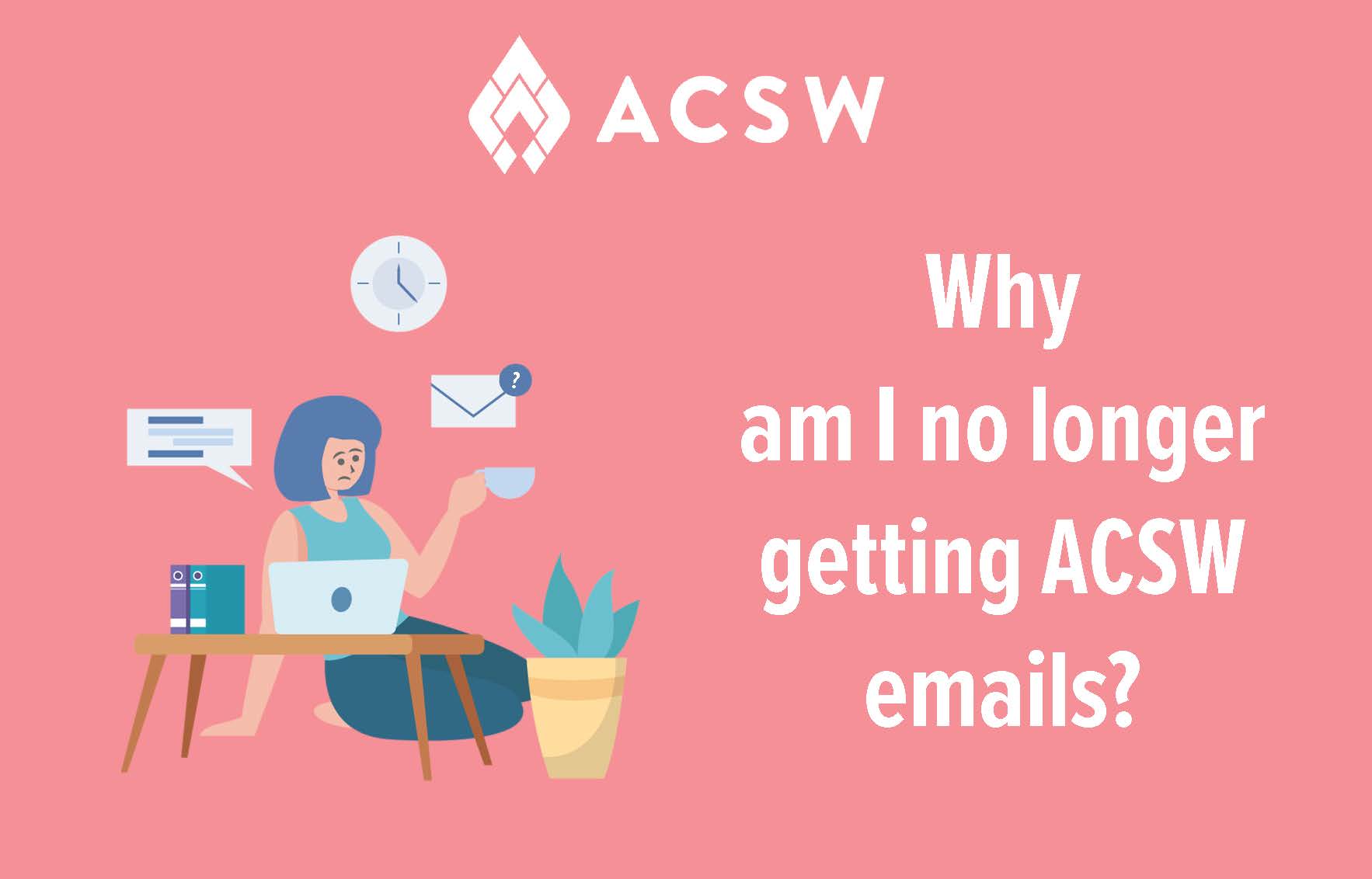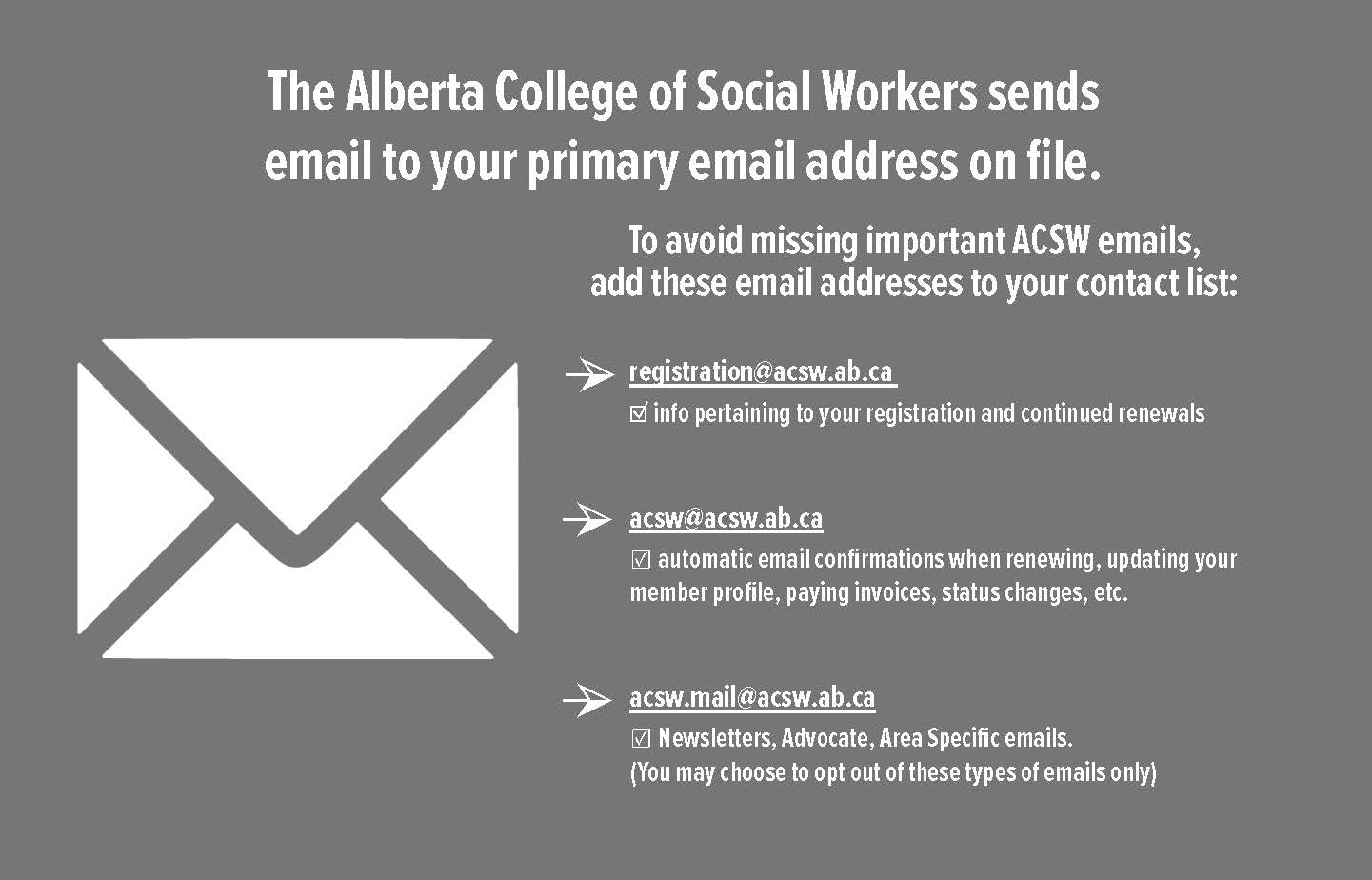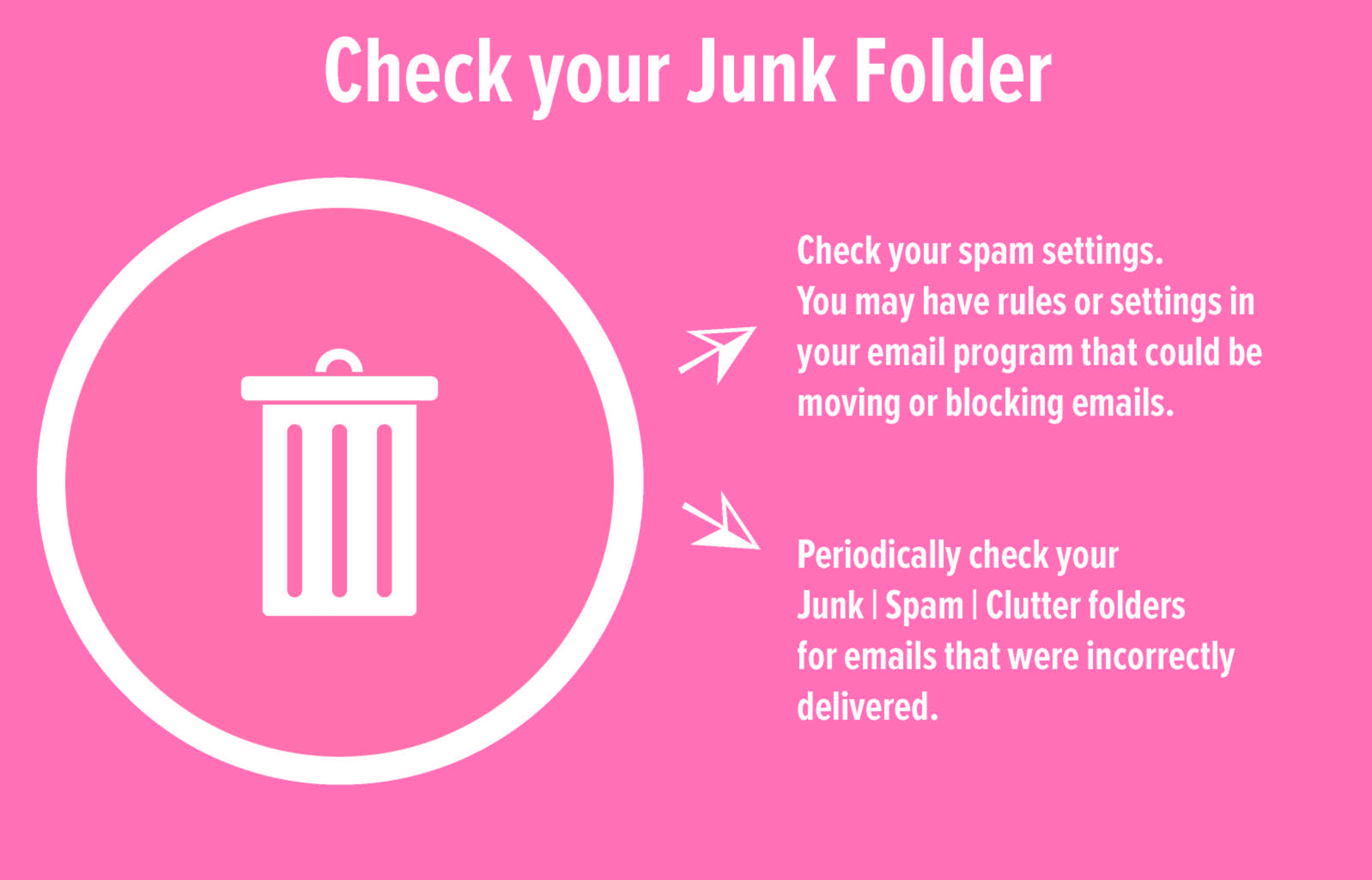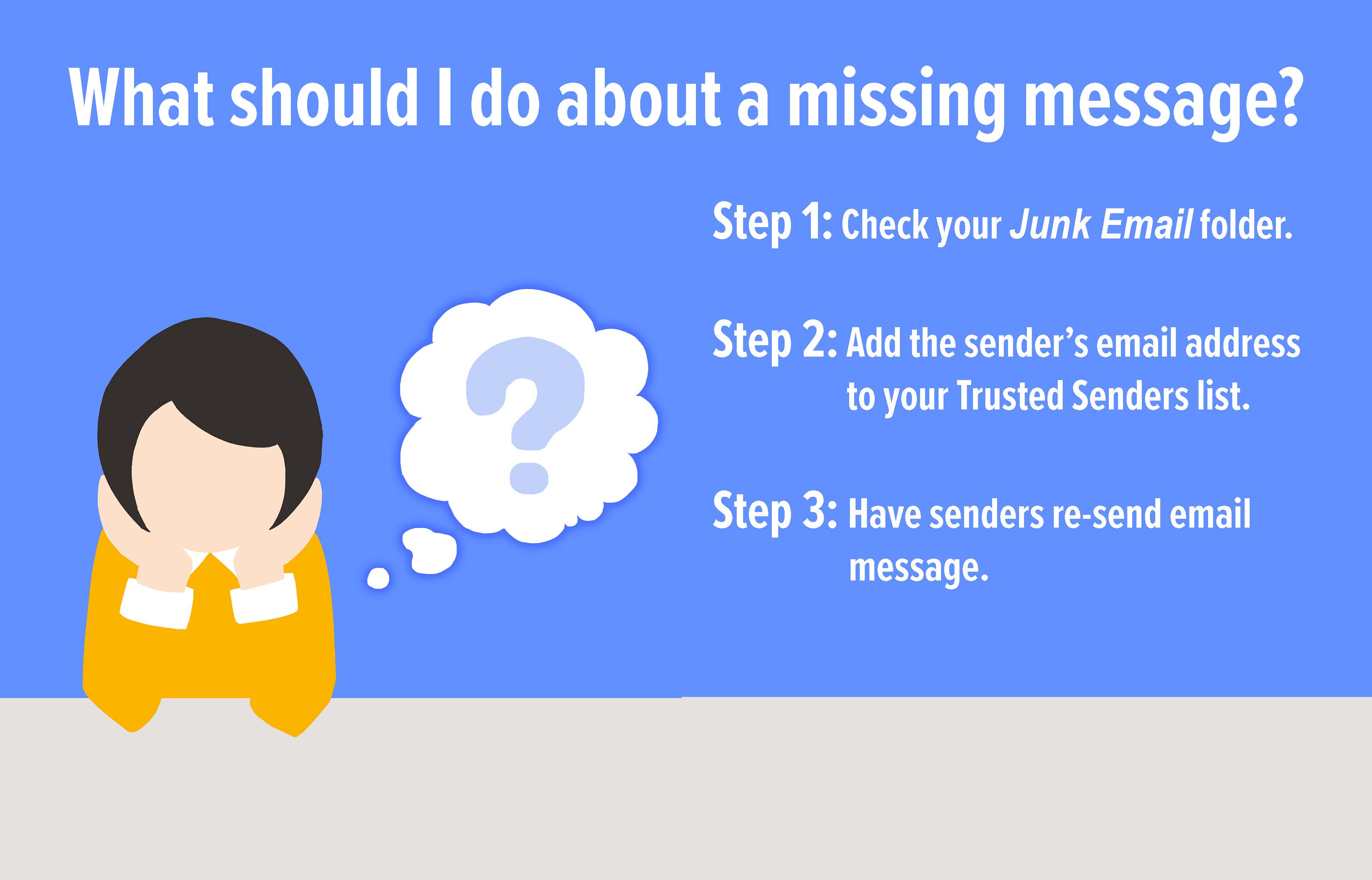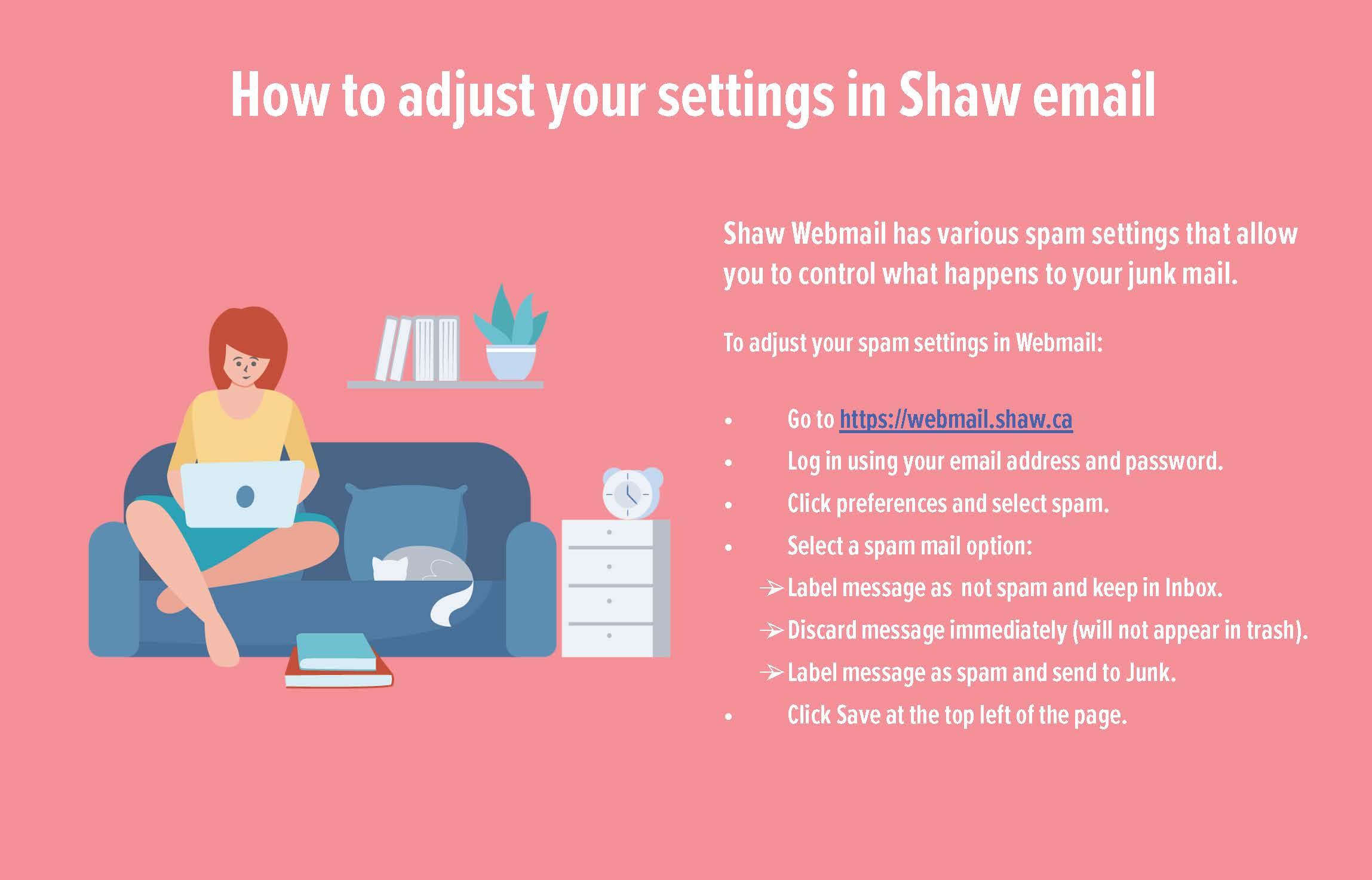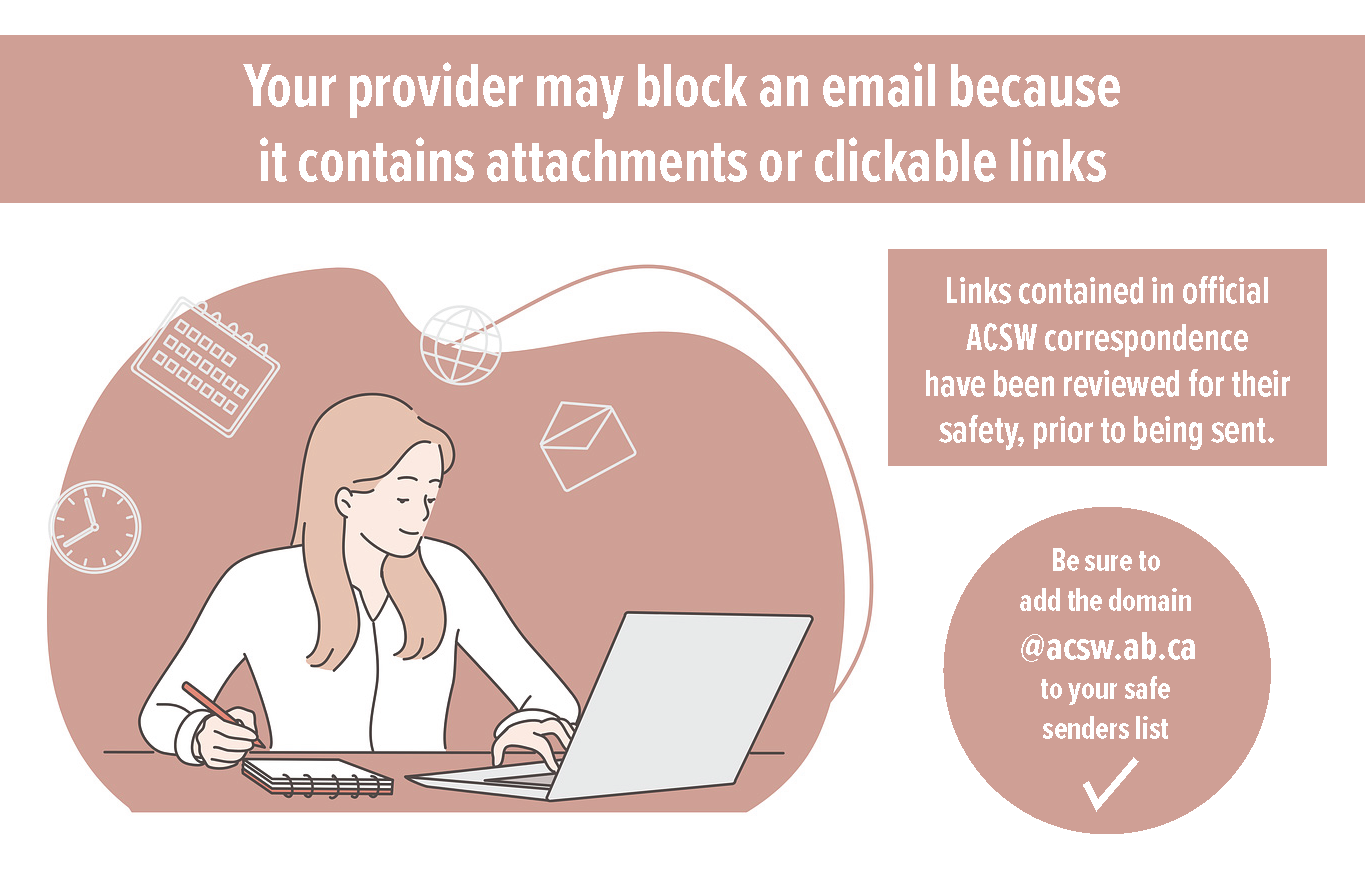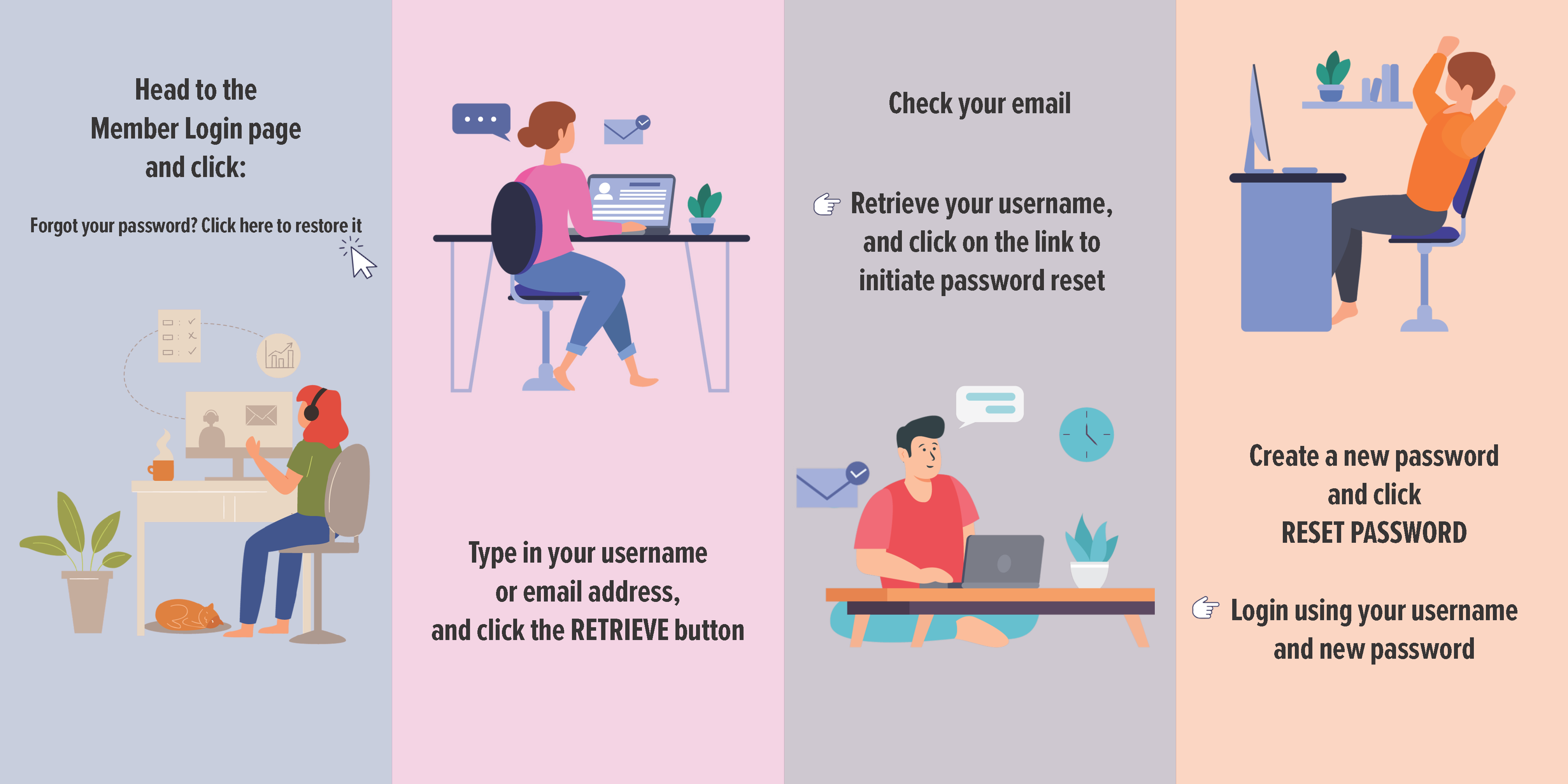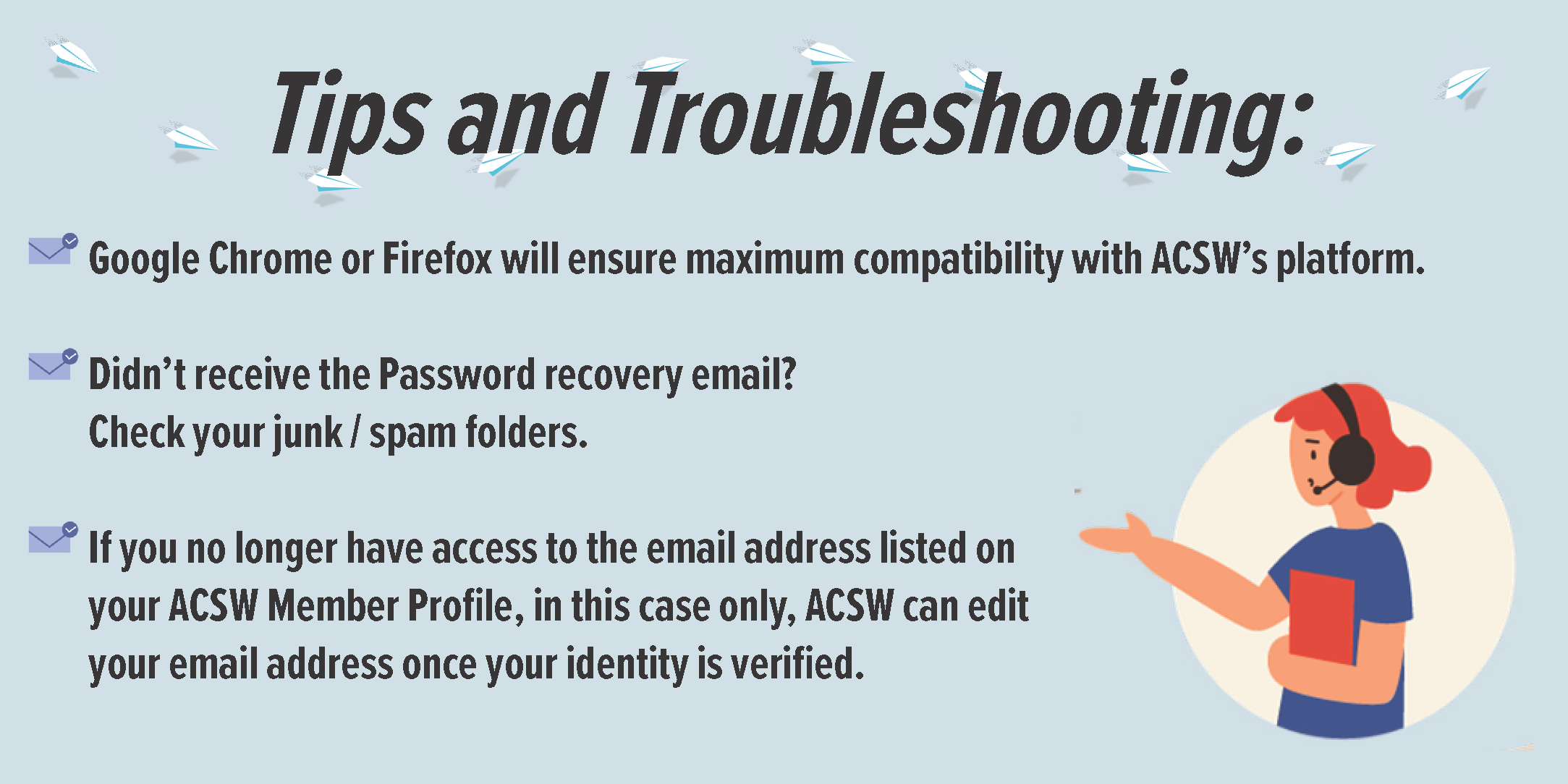FAQ
Advanced clinical practice is demonstrated through a combination of education and experience. The basic requirements for the registry are:
- A clinical MSW or MSW with additional clinical course work
- 450 post graduate clinical hours supervised by someone with an MSW
- An application submitted and accepted by the Clinical Committee
- A minimum of two-years post-MSW clinical practice, including 1600 practice hours, under an approved supervision plan reviewed by the Clinical Committee
- Successful completion of a clinical social work examination
A masters degree in social work is required to apply to the registry as per Social Work Profession Regulations.
Supervision must be provided by either:
a) An Approved Clinical Social Work Supervisor; or
b) An Approved Clinical Supervisor of Record – (approved by completing form C.1 and submitting the Applicant’s application package)
*see policy
Supervision may be arranged outside of the employment setting. Supervision plans must be approved by the Clinical Committee in the application process before the applicant can start counting supervised practice hours.
a) Completion of an application (Form A.1)
b) Detailed resume
c) Transcripts from MSW program
d) List of continuing competency activities related to clinical practice over the last 2 years
e) Reference letters from 2 mental health professionals, at least one of whom must be a Clinical Social Worker
f) Completion of a Supervision Plan A.2
g) Letter of Agreement (Form A.3) if there is more than one supervisor providing supervision.
Complete application packages are submitted to the ACSW by mail, attention Clinical Committee, or electronically to clinical@acsw.ab.ca
The Committee meets 4 times per year to review new applications: February, May, September and November. Applicants are notified of the Committee’s decision within 10 days of the meeting.
The Committee also meets by conference call once monthly during the months when there is no in-person meeting. Additional documentation may be submitted for review at these meetings, but the Committee will not review new applications at the conference call meetings.
You should always identify yourself first as a Registered Social Worker (RSW), then as a Clinical Social Worker using any of the following titles: Clinical Social Worker, Registered Clinical Social Worker, RCSW. The foregoing are protected titles and only members of the registry may use those titles.
You will be unable to renew your membership on your member portal page until your competence submission is complete. Please make sure you input all the activities you have completed during the year and if your credit requirement has not been met you will need to contact the ACSW office.
The Competence Committee and the ACSW strives to be understanding during difficult times for our members. As such, when a social worker experiences a personal crisis (for example, decline in health) or natural disaster (fire or flood) the ACSW will review on a case by case basis and will work with the social worker to develop a plan for his/her portfolio. If you have experienced a personal crisis or a natural disaster, please contact the ACSW to discuss your options before your portfolio is due.
There are many organizations that accredit continuing education programs. ACSW will recognize those approved for social work or related disciplines by an independent assessor (for example, another professional regulatory board, an academic institution, etc.). Organizations that provide continuing education for social workers are encouraged to apply for Approved Continuing Education status with the Association of Social Work Boards. ACSW does not approve continuing education on an individual basis.
Before registering for a program, it is recommended to check with the provider to see if their program has been assessed for continuing education credits. Note also that a registered social workers may claim Category A credit if the program aligns with their learning plan goals and the social worker completes a Category A credit form. (This is now completed online when reporting competency activities).
ACSW does not provide a comprehensive list of all of the continuing education providers as this would be an impossible task. However ACSW does provide a reference list through the online registration system for members to use at the time that they are reporting continuing competence activities. A good resource for finding approved providers is available through the Association of Social Work Boards (ASWB) website where social workers can view providers approved though the ASWB ACE program. https://www.datapathdesign.com/ASWB/ACEdswb/Prod/cgi-bin/ACESearchDSWBDLL.dll/acesShowProviders
If the information you are seeking is not noted, contact the provider. ACSW is not responsible for the information on the site and cannot answer questions about programs delivered by other organizations.
The competence program has now been in place for a number of years and during this time the majority of social workers in Alberta have demonstrated that they are meeting or exceeding the program requirements each year. Therefore, rather than requiring all social workers to submit a full portfolio every five years, social workers are now randomly selected to submit a portfolio with 1, 2, 3, 4 or 5 years of information, or just their Professional Development Credits.
All social workers are still required to complete the full portfolio, including a self-assessment and learning plan for each year, which may be requested at a future date if any concerns arise. In this case, a member would receive a letter approximately six months prior to renewal in the relevant year detailing what to submit.
T he response to this question depends on a number of factors. Retired members who do not wish to return to practice do not need to submit competence requirements.
A member who is taking an extended leave to pursue other interests but who eventually plans to return to social work has two options: One is to complete the program requirements for inactive members. This requires at least 10 credits be completed annually, but does not require any Category A activities. The member must still complete the Self-Assessment and Learning Plan to show how they are maintaining their competence in social work. The other option is to cancel their registration until such time as they plan to return to practice, and deal with any competence requirements that may be necessary for re-entry to practice.
Inactive social workers who have five years with no recommended competence completed must complete an exam to become active. If an RSW is cancelled they are required to write an exam after three years.
Providers should reference the Continuing Competence Program Member Handbook for information on providing category A credits. Accreditation in terms of continuing education means that the provider has been through a quality check process with a professional continuing education organization. ACSW is not able to provide accreditation in house, but the Association of Social Work Boards (ASWB) provides this service.For more information on becoming an accredited provider under the ACE (Accredited Continuing Education) program, go to: https://www.aswb.org/ace/details-about-the-ace-program/
We recommend the ASWB, but there are many other reputable professional continuing education organizations. For a list of some of these organizations, please reference the Competence Handbook . ACSW also accepts credits that have been approved from any of the health profession colleges and universities.
T he programs allows for flexibility during maternity/parental leave. If you are absent from work for a full year, it will mean that you are “inactive” for one registration year. You are still recommended to submit competence while inactive, the only exception is that the credit requirement is reduced to 10 credits per year. While away, there is no mandatory Category A requirement, the credits can be completed in whichever category or combination of categories that best meets your learning goals. You may wish to focus on self-care activities such as exercise and nutrition. You may wish to review literature on child development.
While inactive both self-assessments and learning plans are still required to be completed for this period as part of your return to work plan and kept in your updated portfolio. The ACSW forms may be difficult to complete when inactive.The narrative formats of the self-assessment and learning plan are recommended in this situation. Additional information is available on the ACSW website.
The registration year rarely coincides with the period of maternity leave. It is important to plan ahead and perhaps consider a two year period which encompasses the leave. There may be some overlap between a period of being “inactive” and part time. If you require further assistance, please feel free to contact the ACSW office.
In Alberta, the entire profession of social work is regulated under the Health Professions Act (HPA). According to the HPA, Schedule 27, the practice of social work is defined as follows: In their practice, social workers do one or more of the following:
- enhance or restore the social functioning of individuals, families, groups, organizations and communities by improving developmental, problem-solving and coping capacities of people and systems,
- promote effective and humane systems that provide resources, opportunities and services to people and link people to those systems,
- contribute to the development and improvement of social policy,
- (c.1) teach, manage and conduct research in the science, techniques and practice of social work, and
- provide restricted activities authorized by the regulations.
Social workers promote social change and enhance people’s well-being. They help individuals develop problem-solving skills and feel self-empowered. Specific duties and client populations vary from setting to setting. Social workers may work in:
- Family counselling agencies, where they provide assessment, counselling, treatment, and referral services to individuals and families in areas such as parenting and marriage counselling
- Health-care teams in hospitals, mental health and addictions clinics, or home-care agencies
- Community health teams, where they work with patients and family members to overcome emotional, behavioural, social, or financial difficulties
- Correctional services, where they work with youth and adult offenders
- The education system, where they provide counselling and consultation services to students, parents, and teachers
- Government social-service departments, where they deliver social policy and advocacy through channels such as income support, child protection, childcare, or foster care and adoption programs
- Community agencies, where they develop prevention and intervention programs to address problems such as homelessness, family violence, addictions, and racism
- Residential settings, where they provide counselling, role modelling, crisis intervention, assessment, advocacy, and referral services for children, adolescents, seniors, and people with disabilities, mental health challenges, or addictions
- Employment assistance programs and private employment agencies, where they provide employment-related assessment, counselling, treatment, and referral services
They may also work in:
- Program development, organizational development, and evaluation
- Social research, planning, and advocacy organizations
- Community and economic development with marginalized groups
- International social work in developing countries
- Settlement, immigration, and other cross-cultural services for new Canadians
- Programs that provide assessment and counselling services, training seminars, or services related to policy development, program planning, evaluation, and research
- Administration and management of social service agencies and programs
See Alberta alis for more occupational information Click here for Alberta alis’ occupational information.
No. “Social Worker” is a protected title in Alberta. A social work degree + registration at ACSW = social worker. Those practicing in the scope of social work, with a social work degree, have a mandatory registration obligation in Alberta.
Please see the registration tab on the main webpage to see the qualifications, application requirements and fees.
Registration is required if you have a social work credential and you are practicing within the scope of social work. This includes paid and volunteer social work services. Registration is also mandatory for those who supervise RSWs who provide professional services and those who teach social work practice.
It does not matter what title you use. If you have a social work credential and your practice fits within the scope of practice, you must be registered. The title “Social Worker” may only be used by registered social workers, but registration is required even when you do not use the title.
An employer is free to set any job requirements for hiring. However, the employer cannot determine that a qualified social worker does not have to be registered. The Health Professions Act does not grant any profession an exclusive scope of practice. There are restricted activities that may only be performed by regulated health professionals, but many activities may be performed by others who have gained the skills and knowledge through other routes. This may mean that you are doing the same job as another person who is not required to be a registered social worker because that other person does not qualify for registration. That person is not a social worker.
If you qualify for registration, the bottom line is that you are not eligible to practice within the scope of social work without being registered. The Health Professions Act (HPA) sections 47-49 detail how it is an offense to practice without registration and outlines the repercussions for individuals and employers that do not comply.
Yes. Being a registered social worker is an indication that you are a trusted professional and accountable to the public and the profession. You are encouraged to use your RSW designation and indicate your educational qualifications on all professional documents. This information can also be found on the public register
The Health Professions Act requires that regulatory colleges post a public register ( public register ) and provide a practice permit. The practice permit comes in both wallet and wall size. Active social workers can save and print a copy of their own practice permit that details the registration expiration with any practice enhancement or restrictions. The public register and practice permit serve as proof needed for employers or clients. Please note the public roster is more up to date than a printed practice permit.
There are multiple application paths to become a registered social worker, and each has different requirements based upon different circumstances. For instance, we have applications for those with international social work credentials (requires an equivalency assessment), new graduates (time limited), and those actively registered in another recognized jurisdiction (requires registration verification). Review Registration web page for details to understand which is the appropriate application for your current circumstance.
No. Application review is not an automated process. Complete applications, with application fee, and supporting documents are typically reviewed within two weeks of submission. Volume of applications in process impacts registration timelines. Please note that from April through June our volume is high due to increased new graduate applications. ACSW does not offer an expedited application process as all applications are processed in the order they are received. Upon approval of complete application, you will be notified by email with a request for payment of annual registration fees. Please ensure you can receive email from our domain; acsw.ab.ca.
The ACSW will accept a copy if it was produced within the last 3 months and is valid at time of registration application processing. If it is older than three months, you must provide a new criminal record check. We will accept electronic criminal record checks. A vulnerable sector check is not required for registration but will not be rejected if included.
A criminal history record does not necessarily prohibit you from registering as a social worker. You must disclose your criminal history to be individually assessed for potential to be a trusted professional. A fingerprint report may be necessary when the criminal record check can not confirm your identity or criminal history.
For the purpose of registration, we will accept a letter issued by the educational institution that states you have completed all requirements for your social work program and provides a conferral date. This is often provided through the registrar’s office when all graduation requirements have been met. Official transcripts must be submitted during your first year of registration.
Supervised practice hours are completed after registration while on the provisional registry. They are not completed before registration.
This registry allows social workers to practice until they have met their outstanding registration requirements to progress to the general registry. Most new registrants are on the provisional registry. Typical requirements on the provisional registry can include supervised practice hours, supervisor reference, outstanding documentation, and/or entry to practice exam.
Yes. You will have access to a practice permit that details you are on the provisional registry. You are entitled to use the following titles and abbreviations: Registered Social Worker, Social Worker, RSW, SW, Soc. Wkr. RCSW and Registered Clinical Social Worker may only be used by social workers on the Clinical Registry.
RSWs on the provisional registry are typically new to regulated social work practice and should not be in the position of providing practice supervision until they have more experience and are on the general registry. Individual authorization for restricted psychosocial interventions, clinical registration and mobility to other provinces can be limited to those on the general registry. Employers may have limitations on RSWs on the provisional registry that may impact recruitment, duties, or wages. Additionally, an employer might recruit only RSWs on the general registry.
For most applicants, registration on the Provisional Registry is granted when their application has been approved and registration fees have been paid. RSWs with provisional supervised practice requirements are required to demonstrate that they have completed their specified hours of regulated social work practice under the supervision of an RSW on the general registry. ACSW credits supervised practice hours after the date of registration. This requirement is concluded with the submission of supervisor reference form(s).
Practicum hours meet education requirements to gain a social work credential from a post-secondary institution. Practicums do not meet the requirement of regulated practice under the supervision of a qualified social worker.
An RSW on the general registry may provide practice supervision and complete the supervisor reference to ensure you are a safe and competent social worker. A fully registered social worker in another recognized jurisdiction may provide practice supervision (they may also require courtesy registration with the ACSW). Out of jurisdiction supervision might not orient you to all the norms and expectations in Alberta. If your practice supervisor is on the provisional registry, your supervised practice hours will not be recognized. Please ensure that your practice supervisor is not a family member/in-law/partner and is a different person from the character reference at the time of application.
You would need to make arrangements with a fully registered social worker to receive practice supervision to discuss your practice and ensure safe and competent social work practice. Your employer may be able to help you make these arrangements through a partnering organization or elsewhere within your own organization. ACSW permits external supervision, however, your employer may have policies regarding this.
The purpose of practice supervision is to provide an environment for safe and confidential dialogue where social workers can reflect upon and discuss their practice and their response to it. This is where social work knowledge and skills are developed in a supportive framework while reinforcing professional social work obligations and values.
Supervision must be completed by an RSW on the general registry regardless of level of social work education. Typically, new social workers participate in 1-2 hours per month in dedicated practice supervision. The practice being supervised is that which falls within the scope of social work. Practice outside the scope may be excluded from practice hours tracked. The practice supervisor is attesting to supervision of safe and competent social work practice and the number of practice hours.
You must meet all outstanding registration requirements (e.g. outstanding documentation, updated professional liability insurance, completed all supervised practice hours, passed exam). A supervisor reference form must be submitted online to verify you have completed the specified hours of supervised practice where the RSW providing supervision also attests to your safe and competent practice under their supervision.
The supervisor reference form is initiated by you through your member portal which sends an email to your supervisor to answer a few questions and submit all supervised hours. Once your supervisor reference has been received by our office it will be processed in the order received. You can review the status of any supervisor references through your member portal. If your supervisor is a registered social worker in a different jurisdiction, please contact the Registration Department.
Those applying within three years of completing their recognized social work credential are not required to take the entry to practice exam. The exam is one of the tools used to demonstrate current competence in generalist social work practice. Individual files are assessed at application to determine when the exam is appropriate (e.g. no regulated practice in recognized jurisdiction for past 3 years).
The assigned exam is based upon your highest level of social work education and is expected to be passed within the first year of registration. ACSW uses the Association of Social Work Boards (ASWB) standardized exams at the associate, bachelor, master and clinical levels. The exam may be attempted multiple times within the year following ASWB policies.
Registration for the exam is administered by ASWB and it’s a 2-step process. (1) You need to register for the exam before (2) scheduling an appointment to take the exam with the test administration centre. Payment for the exam is required at the time of registration with ASWB. Exam candidates are encouraged to register as soon as possible to negotiate this multi-step process. ASWB offers non-standard testing arrangements (aka accommodations) that must be arranged before exam registration. Please see ASWB site: Click here to see ASWB website
We can only recommend ASWB’s exam preparation materials. Please see the free ASWB Exam Guidebook and exam content outlines. We strongly recommend their online practice test at an additional cost. See ASWB page: Click here to see ASWB website
Exams are available on demand any time of the year, dependent upon availability with the test administration centre.
It is not an American exam. The ASWB is an organization that provides supports for social work regulatory boards and colleges throughout Canada and the USA. They are located in the USA and use US currency. Our collective resources are used to ensure the exams are created by industry experts and are fair, valid, and reliable. Canadian social workers contribute to the exam content.
Registered social workers require professional liability insurance coverage as per the Health Professions Act (s. 28(1c). Insurance must be updated in the Alberta College of Social Workers (ACSW) member profile. For RSWs who are employed, this requirement can be met through your employer's malpractice insurance coverage; however, it is recommended that RSWs obtain their own coverage. ACSW does not specify a minimum amount, type, or provider of professional liability insurance.
Yes. All practicing RSW’s must have professional liability coverage. You will want to address this issue with the agency to determine if you are satisfied with their professional liability coverage or prefer to get your own.
Yes. In addition to annually updating professional liability insurance, RSWs participate in the continuing competence program (self-assessment, learning plan, document competence activities), submit annual renewal and professional declarations, fees, maintain up-to-date profile with name, employer, and contact information. Minimally, annual review of the standards of practice and code of ethics is expected.
The standards of practice require that all social workers, including those on the general registry, require ongoing practice/clinical supervision or peer consultation appropriate to their field of practice and setting.
Yes. This is an expectation in the standards of practice. The ACSW is in the position of verifying your level of social work education for a client, employer, or insurance provider, etc. Your education record should be kept up-to-date with submission of an official transcript detailing the social work credential conferred.
Your registration is renewed annually based upon your registration quarter at the initial date of registration. The practice permit and member portal will list your expiration/renewal date. Registration renewal is due at midnight before the listed date.
The ACSW year is divided into four quarters based upon this chart:
| Registration Issued | Renewal Due Before |
|---|---|
| December 1st – February 29th | January 1st |
| March 1st – May 31st | April 1st |
| June 1st – August 31st | July 1st |
| September 1st – November 30th | October 1st |
A completed renewal includes renewal application with updated demographics, continuing competence data entry, and payment of registration fees. Suspensions, late fees and cancellations are activated at 12:00 am (midnight).
When suspended or cancelled, practice in the scope of social work is not authorized.
No. There are three options available when RSWs are not practicing social work; (1) remain active, (2) convert status to inactive, or (3) cancel.
Inactive: Registration status may be changed to Inactive, with no practice permit issued. This status is designed for those on temporary leave, such as parental leave, and medical leaves of absence for 1-5 years. This must be renewed annually.
Cancellation: You may also cancel your registration while you are not practicing and reinstate before your return to social work practice.
Yes. You will be required to complete an application for reinstatement of registration (see the Registration section on the ACSW website for full details). You will need to provide details of your continuing competence activities during your leave (if any). Depending on the purpose of your leave, you may be asked to provide additional information to assess your return to practice requirements.
You may not practice social work while your registration status is inactive and the public register will note your status. While participation in the continuing competence program is not required while inactive, it is recommended to maintain ongoing professional competence. Your continuing competence record will be assessed before active registration, and additional requirements for competence activities, supervised practice and a return to practice exam may be assigned. Inactive status 5+ years will be assigned additional return to practice competence requirements and placed on the provisional registry.
Those who go inactive with an outstanding exam requirement, will be required to pass the exam before active registration. Changing status to active registration is not an automated process, and staff may request additional information as necessary. Additional fees may be assessed depending upon date of status change and renewal date.
ACSW does not support a retired non-regulated member status. You may consider your options to go inactive or cancel your registration.
This status impacts continuing competence requirements only; it does not impact annual registration fee. This allows RSWs who practice social work less than 1000 hours per year, to reduce their continuing competence requirements. Full-time status is for RSWs who practice social work more than 1000 hours per year. While this is an option, consider that less social work practice may drive the need for greater attention to ongoing continuing competence efforts.
You may log into the ACSW member portal to edit your profile by adding a new membership conversion form. You will be notified once the change has been made and you can monitor the status change by logging in.
Please see the Restricted Psychosocial Interventions page under the Registration Tab for more information.

